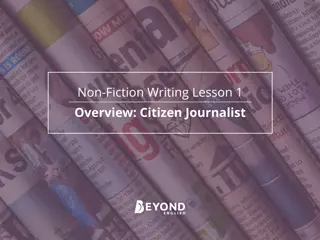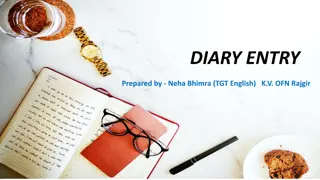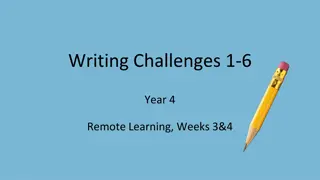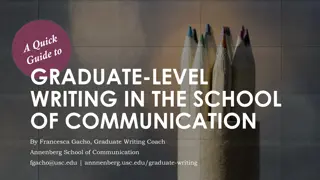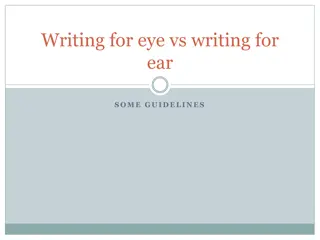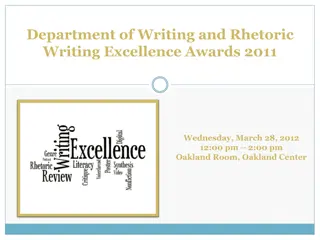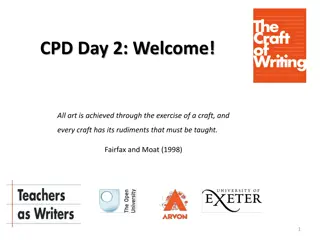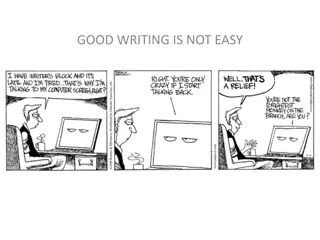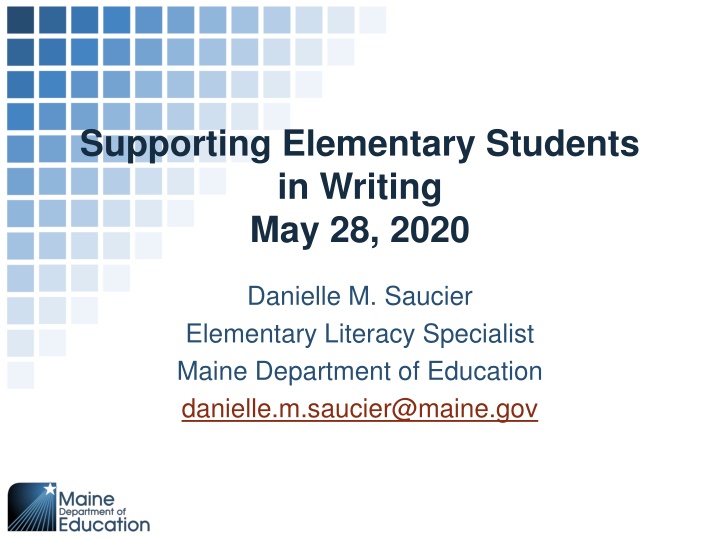
Enhancing Elementary Students in Writing Skills
Explore the importance of writing skills for elementary students, including strategies to support writing stamina, modes and forms of writing, and the role of writing across all disciplines. Learn about writing tools and processes to enhance communication skills effectively.
Download Presentation

Please find below an Image/Link to download the presentation.
The content on the website is provided AS IS for your information and personal use only. It may not be sold, licensed, or shared on other websites without obtaining consent from the author. If you encounter any issues during the download, it is possible that the publisher has removed the file from their server.
You are allowed to download the files provided on this website for personal or commercial use, subject to the condition that they are used lawfully. All files are the property of their respective owners.
The content on the website is provided AS IS for your information and personal use only. It may not be sold, licensed, or shared on other websites without obtaining consent from the author.
E N D
Presentation Transcript
Supporting Elementary Students in Writing May 28, 2020 Danielle M. Saucier Elementary Literacy Specialist Maine Department of Education danielle.m.saucier@maine.gov
Final Session in Elementary Literacy Series Supporting Readers - input May 7th Phonological Awareness & Phonics May 14th Vocabulary & Spelling May 21st Comprehension & Fluency Supporting Writers - output May 28th Writing
Maine Teachers Define Writing Writing is a lifelong, essential tool for communication. In order to prepare students for varied and evolving writing tasks, students should write routinely, in both long- and short-time frames, as a means of building writing stamina. Moreover, students should write in a breadth of modes and forms across all disciplines. This includes the foundational instruction of legible handwriting forms and skills such as printing, cursive, typing, as well as the use of technology to compose, where the use of formatting supports the task, audience, and purpose. (Preamble Provisionally adopted Maine Learning Results April 2020)
Writing as a Tool For Communication Employers enter communication as the most important workforce skill. Writing to convey information is a crucial skill of education Messages, orders, instructions, letters, directions, reports, memos, emails, lists, summaries, logs, etc.
Writing Stamina Student ability to focus and write for extended periods of time without becoming distracted or giving up. Generally writing stamina becomes stronger as the physical act of foundational skills becomes less mentally taxing and the ability to write for extended periods of time increases.
Writing Across All Disciplines Writing requires thinking - Clarify content Clearly express content ideas Give rationale for understanding of content Narrow and formatively assess confusions
Writing Tools and Processes Spelling Word Choice Organization Grammar Conventions Legibility Printing Cursive Keyboarding
Writing for Task and Audience Students must know: Purpose for writing What writing is trying to communicate Audience the writing is geared for Appropriate choices for each must be taught
Determine the Struggle of the Writer Ideas I don t know what to write about. I don t have anything to say. Organization I don t know how to start. I m done. Writing Refusal or Disengagement I can t. This is dumb. I hate writing
Supporting Writers What Work Clearinghouse (2018) Recommendations for Teaching Elementary School Students to Become Effective Writers 1. Write daily 2. Teach writing process 3. Teach variety of purposes for writing 4. Teach fluency in handwriting, spelling, sentence construction and word processing. 5. Engage writers in high interest writing tasks
Write Daily Ideas Pre-writing Brainstorm or free write Use a book or illustration for inspiration Discussions share ideas orally Teacher models Graphic organizers Write collaboratively Use sentence starters or framed paragraphs
Write Daily Organization Break down into smaller pieces that are more simple Graphic organizers Teacher models Guided writing Small, focused lessons on one area of writing
Write Daily Motivation Vary purpose, task and audience Vary mode Vary content Small or individual writing conferences with concise feedback Small celebrations Make writing tasks relevant to students Develop background knowledge Publish and share writing Share the pen
Writing Process Planning Brainstorm - graphic organizers to number and sort Brainstorm narrow to main idea and develop Ask, Reflect, Text WWW questions, image and add text TREE - Tell what you believe 3 Reasons why Explain/examine each reason End writing POW Pick Ideas (decide what to write about) Organize notes into a plan Write and expand ideas
Writing Process Draft Keep it to very short parts Focus on one aspect (i.e. strong topic sentences) Give models Share the pen Share Share into tape recorder Share with peer practice giving constructive feedback
Writing Process Evaluate Teach students to self-evaluate and question Are my ideas clear? Does my writing match my task, purpose and audience? Celebrate self-evaluation and reflection Share feedback Encourage students independence Revise & Edit Lots of planning and talk Word processing Tools to simplify
Varied Writing Purposes RAFT Role of the Writer: Who or what are you as the writer? A pilgrim? A soldier? The President? Audience: To whom are you writing? A friend? Your teacher? Readers of a newspaper? Format: In what format are you writing? A letter? A poem? A speech? Topic and strong verb: What are you writing about? Why? What's the subject or the point?
Ideas for Writing Purpose Describe Place or a thing Character Nature or science observations Experiences Feelings Narrate Diaries and journals Eyewitness accounts News and events Short stories
Ideas for Writing Purpose (cont.) Inform Summarize new learning Directions Instructions Letters News Reports Persuade Editorials Essays Reviews Analysis
Handwriting & Keyboarding Pencil grip Write letters fluently formation paths Tracing Motor movement large and small Start early Make it fun Practice takes repetition Look at free typing apps (i.e. Type a Balloon, Keyboarding Zoo, Animal Typing)
Spelling About 850 words account for 80% of words in elementary school Phonological Awareness Phonics Morphology Sight words Hands on word work Word games Self-checking strategies Spelling connections within reading and writing
Constructing Sentences Sentences are a smaller unit for students to learn and develop writing ability as building blocks less stress on working memory Sentence frames Sentence expanding Sentence combining Mentor Sentences Generative sentences
Sentence Frames I like _____________. I like __________ and ____________. My _______________ is _____________. Pizza is ___________________ because ___________________ and _____________________ but ____________________.
Sentence Expanding The dog napped. The big dog napped. The big brown dog napped. The big brown dog napped on the couch. The big lazy brown dog napped on the couch. The big lazy brown dog napped on the couch while I read a book.
Sentence Combining The boy was small. The boy was riding a bike. The boy went to the store. The boy bought a candy bar. The small boy rode his bike to the store to buy a candy bar.
Mentor Sentences The early summer sky was the color of cat vomit. Uglies by Scott Westerfeld 1 The sky in the summer time is a strange shade of orange, green, and brown. 2 The summer sky is ugly. 3 In the morning, the summer sky is putrid. The Literacy Effect Jeff Anderson
Generative Sentences Use the word hunch as the 4th word in the sentence. I had a hunch that today was going to be hot. Add a because I had a hunch that today was going to be hot because there was a haze before the sun came up. ReadWriteThink
High Interest Writing Tasks Model and share your own writing as an adult Have deep conversations and Think Alouds as a start to recording thoughts and ideas in print Connect writing to background knowledge and authentic experiences hands on learning Allow students to develop writing together Keep authenticity at the forefront task, audience and purpose. Provide immediate feedback
Writing is an act of faith, not a trick of grammar. E.B. White
Thank You https://bit.ly/36DIbyB If you need any additional assistance or information please email me danielle.m.saucier@maine.gov

